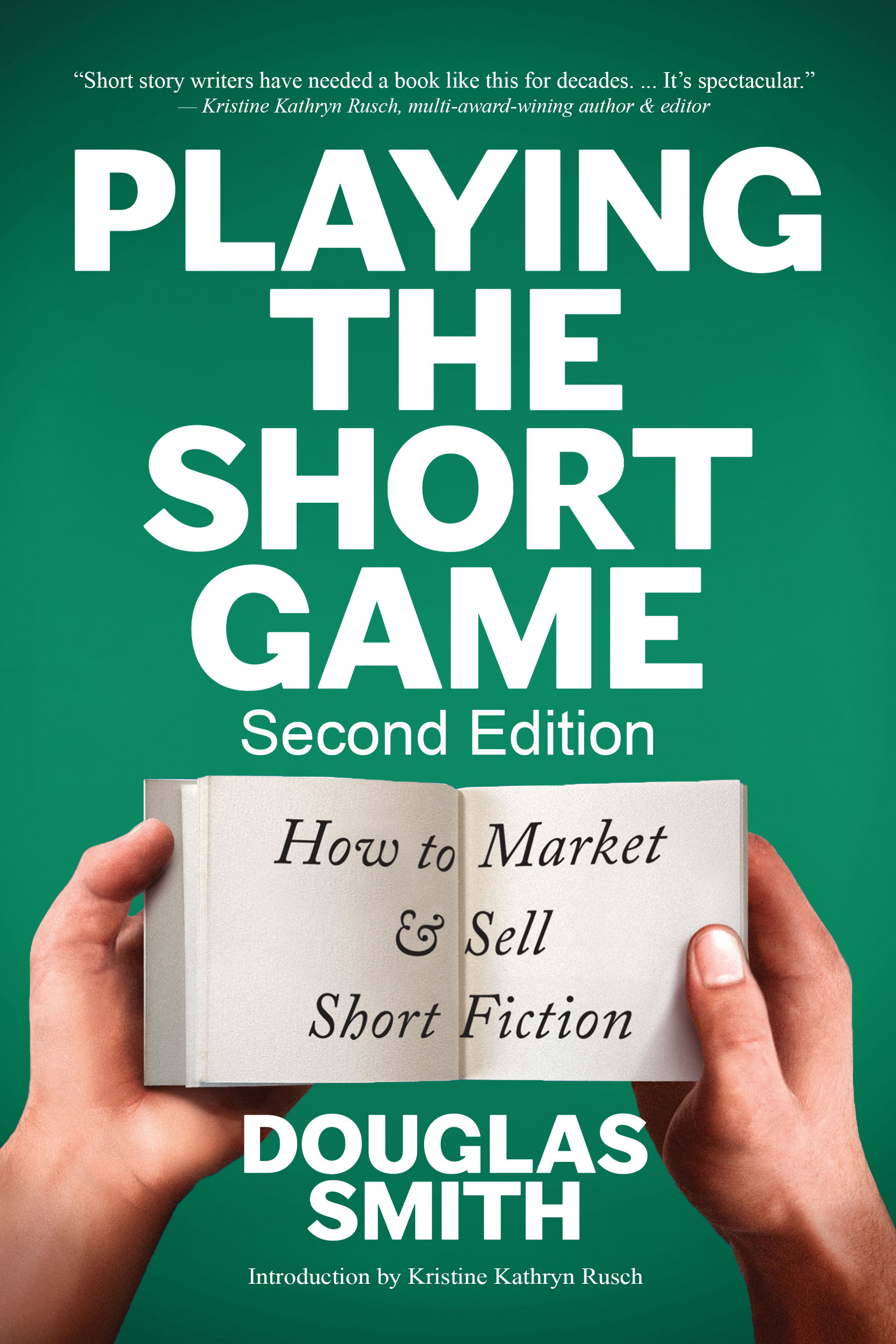Selling to Foreign Language Markets
by Douglas Smith © Aug 2009
When considering potential markets for short fiction, many SF&F writers overlook the many non-English language genre magazines and anthologies published around the world. This article discusses why you might want to consider these markets and how to sell to them.
Why Submit to Foreign Language Markets?
Especially if you can’t read that particular language?
First, it broadens the audience of readers who gain exposure to your work. If you write novels as well as short fiction (or plan to), a resume of short story sales in non-English markets can assist in foreign rights sales for your longer work, as can the relationships and contacts that you'll build with foreign publishers, editors, translators, and illustrators. And it doesn't hurt your public profile to say that you’ve published stories in twenty-eight languages and twenty-two countries.
Secondly, anything you make from these sales is found money. Yes, you'll generally get less for foreign reprints than you did for selling first rights to a professional English market, but remember that you can sell your reprints in multiple languages. My foreign language sales have ranged from $30 to $300 per story, averaging about $100 per sale – so with sales to several foreign markets, you can easily pick up an additional few hundred dollars per story.
Finally, if you're a beginning writer, there's the fun factor--the chance to see your name alongside of some of the biggest names in fiction. Even when I was starting out writing short fiction, my foreign language sales let my name appear with the likes of Steven King, Larry Niven, Kristine Kathryn Rusch, Mike Resnick, Tanith Lee, Neal Stephenson, Orson Scott Card, Frank Herbert, not to mention James Branch Cabell and H.P. Lovecraft.
In addition, many foreign magazines will include beautiful illustrations for your story that you won't get in even the pro English markets and which make a great visual addition to your website.
How to Find and Select Foreign Language Markets
Assuming that you're now interested in submitting to a foreign language market, how can you find out where to submit?
Well, I maintain the Foreign-Language Market List (FML) on my web site. The FML lists over seventy active foreign markets, but before you run to the list and grab a market, first let's discuss how to choose where to submit. Here are the rules that I follow:
Rule 1: Never submit a story to a foreign language market until you have first sold it to an English-language market.
Many of the top English genre fiction markets have foreign language editions or will ask for an option on foreign language rights. Selling a story to a non-English market first could jeopardize a more prestigious and lucrative English first-rights sale. In addition, it’s a lot easier to sell to a foreign language market if your story has the credentials of a major English market. So that means you are looking for non-English markets that will accept reprints of stories that have appeared in an English market somewhere in the world. That immediately limits your choices, since some foreign language markets publish only local authors.
Rule 2: You are looking for markets that will accept unsolicited submissions.
Although most foreign language magazines publish reprints from English markets, many select those stories themselves from a review of the top magazines such as Asimovs' or the Magazine of F&SF, after which they will approach the author or editor directly. Alternatively, some foreign markets have an agreement with the top NA magazines to reprint selected stories (which is why some top English pro markets purchase foreign language rights). Regardless, these markets don’t accept direct submissions from an author. You may still end up with your story in these magazines, but you have no control over the decision, beyond writing a great story and selling it to a top English market.
Rule 3: Unless you are multi-lingual, you are looking for markets that accept submissions in English and will translate your story at no cost to you.
In my experience, any market that accepts submissions in English will translate at no cost. Some markets, however, will accept reprints and unsolicited submissions (rules 1 and 2), but only in the language of the magazine. Even then, you have options. I sold a reprint to a French magazine that not only did the translation for free, but also provided me with an electronic copy of their translation. That allowed me to sell the translated version to another market that only accepted submissions in French. The translated version of that story went on to win a French-language award that year. So the above discussion leads us to…
The Definition of a Valid Foreign Language Market: A market that accepts unsolicited submissions in English of stories that first appeared in English language markets, and translates them at no cost to the author.
Picking a Market from the FML
The Foreign Language Market List (FML) currently lists markets in over two dozen countries. Go to the list and pick a magazine that meets the above definition of a valid market. I’ve made this easy by identifying the valid markets, flagged as paying or non-paying as follows:
$$$ – Confirmed valid market (paying)
YES – Confirmed valid market (no pay or pays in copies)
The FML also includes "non-valid" markets, with the following flags:
??? – Market under investigation or questionable
NO – Market exists but does NOT accept unsolicited subs in English
DEAD – Dead market
The FML entry for each market provides additional details, including the editor's name, postal address and/or email, whether they take email submissions or only postal subs, payment rates, payment methods, types of genre published, word lengths, and other pertinent information.
Most of these markets now take submissions by email, but check the market's FML entry for how to attach your story (text in body, type of file attachment, etc.). Follow the same rules as you would if submitting to an English market in a foreign country: proper manuscript format, cover letter or email, and for postal submissions, an SAE with two IRC’s. Some of the markets that only take postal submissions will at least reply via email, so you can save on those expensive IRC’s.
Other Considerations and Caveats
Payment is generally in USD or in Euros for most of these markets, and many of the paying markets now provide a PayPal option. However, payment logistics can sometimes be challenging. Some markets will pay only in local currency or via bank transfer, both of which involve banking fees. Some of the larger markets require the author to submit an invoice to their payables department before they'll issue a cheque (a cheque usually drawn on a foreign bank, which is not easy to cash even in a large North American city). Some will also deduct a local income tax withholding amount from the payment.
Response times can also be very long. But remember that you can submit simultaneously to several of these markets since the rights that they purchase are specific to their language and don’t conflict with other foreign markets. In addition, most will respond to email queries regarding the status of your submission.
Communication with the editor can also sometimes be challenging. Many of these editors have excellent written English skills, but some do not. However, in most of the latter cases, the magazine will employ a foreign language acquisition editor, so these difficulties tend to be the exception.
Language can also be a barrier to staying current with any of these markets. The FML includes links to the web sites for most of the magazines, but these sites are generally not in English. Fortunately, I receive regular updates from many of the editors or from submitting authors regarding changes in a foreign language market, and then post these to the FML. I also provide a list of links to web-based translation tools that can assist you in understanding a magazine's web site. These tools can also help in the rare occasion where you receive a reply in the language of the editor. A word of warning regarding translation tools: don't ever attempt to use them to translate from English to the target foreign language and then submit that result, even if it's only a cover letter. They simply aren't that good. In case you don't believe me, try translating any sentence from English to the foreign language and then back again.
Remember also that these markets face the same challenge in staying alive as do English language genre magazines. Many (even the paying ones) are run on a for-the-love basis, so production schedules can vary wildly, as can the time frame for receiving your payment and contributor copies. And some will have short lifetimes. I've had about a dozen foreign languages sales where the story was never published because the market folded. Out of those sales, I've also unfortunately had two situations where I had to involve the SFWA grievance committee to (finally) extract payment for a published story.
Other Tools
I've also included some other useful links for submitting to non-English markets such as translation sites. These sites perform automated translation of short amounts of text. They don’t even come close to providing perfect translations, so do NOT try to translate your stories or even your cover letters. However, these sites are helpful for understanding replies from foreign magazine editors written in their language. Hopefully, you'll give some of the markets in the FML a try. Good luck!










